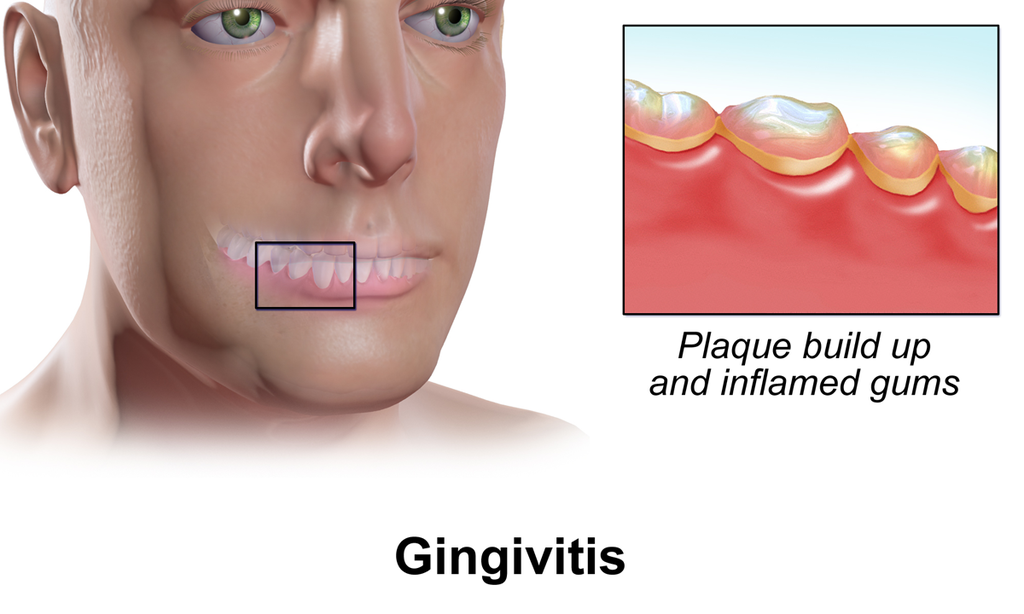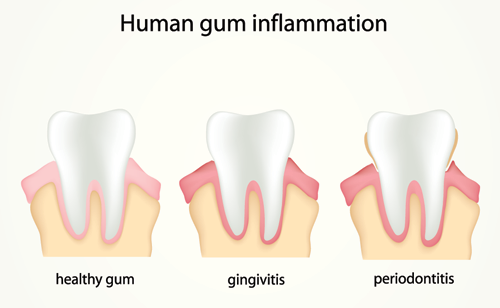Gingivitis is a form of periodontal disease. Gingivitis can manifest in a number of forms, but its trademark signatures are usually gum inflammation and pain. If left untreated, gingivitis might lead to severe dental problems, such as periodontitis, tooth loss and severe infection. This is why gingivitis should not be taken lightly. Is gingivitis contagious through kissing or otherwise? A legitimate question, though owed in no small part to the constant informational bombardment we are subjected to these days, which can make you somewhat of a hypochondriac. Nevertheless, the question is valid and should be given all due attention.
An important point to underline from the start is that there is no universal answer to “is gingivitis contagious?”. There are a number of variables in play here, and only by assessing each one from your particular standing point will you be able to pertinently determine the answer. Is gingivitis contagious? Yes, it is. There is no general rule, however, on whether you will get gingivitis or not, as so much depends on a number of important factors, which we will look at now.
Is Gingivitis Contagious & How can you Catch it?
Gingivitis is contagious. Because it is caused by some types of bacteria, any human body coming into contact with the respective bacteria can potentially develop gingivitis.
Kissing, eating, putting your hand in your mouth and any type of contact between your mouth and infected surfaces can be a cause of transmission. Even objects that we normally consider to be clean, such as dishes and cutlery, are usually not so when microscopically inspected. We could get gingivitis from anything!
Wait, hold on. Then how come many of us don’t have it, despite so many hygienically questionable habits and activities? It’s quite simple actually, and it has something to do with your overall health, lifestyle, immune system and genetic background.
Is Gingivitis Contagious Through Kissing? Yes, but Your Lifestyle Matters More
As we’ve already established, the answer to “is gingivitis contagious through kissing?” is yes. That does not mean you should stop kissing, not at all. What you really need to do is to establish a healthy routine for preserving oral hygiene, together with your partner. In short, this would imply:
- Brushing, flossing and using mouthwash.
- Basic food and table hygiene (wash your hands, use common sense when choosing your food and where you eat).
- Discontinue bad habits (biting your nails, smoking, etc.).
In addition, it’s important to know that the longer two partners stay together, the more bacteria they share until their microbiological ecosystems become very similar.
However, if you suspect someone to already have a form of gingivitis, it’s best to observe some common-sense rules until the condition is cured, which are standard hygiene rules anyway:
- Don’t share toothbrushes, glasses or bottles, and eating utensils!
Is Gingivitis Spreadable? Your Immune System is the Key
No matter how hygienic you are, there is no escaping from being covered in bacteria from head to toe all the time. Recent studies even indicate that it’s actually better to have contact with bacteria (without exaggerating, though). Bacteria are not universally bad, and there are thousands of species which actually play a vital role in preserving our health by preventing truly evil bacteria from taking a foothold.
Children who are allowed to experiment with the surrounding environment a lot, including crawling on the ground, climbing trees and staying outside for long periods of time in general, usually have stronger immune systems that children with overly-hygienic parents who imposed strict cleanliness rules.
This is supremely relevant to our discussion. People with strong immune systems, accustomed to all sorts of microbes, will likely keep infection and inflammation (and gingivitis) at bay because the body’s experience allows it to deploy effective defense mechanisms.
This doesn’t mean that you should stop washing your hands before dinner if you were outgoing as a child. It is quite clear, however, that you are more likely to get infections of any sort, including gingivitis if your immune system hasn’t updated itself to the latest version.
Treatment to boost immunity, alongside healthy oral hygiene practices and the use of common sense when interacting with people and objects can help prevent gingivitis. So is gingivitis contagious? It largely depends on how your immune system can cope with oral bacteria.
How Do You Know You Have Gingivitis?
Gingivitis is usually characterized by inflamed, swollen gums, which bleed when brushing your teeth. The pain can be moderate to severe. In more severe cases, the gum line might recede and cause your teeth to become longer. This is always a bad sign, because it exposes a vulnerable part of the tooth, normally protected by your gums.
Another symptom can be the appearance of small lumps, or pockets, between the normal gum line and the tooth, where food may accumulate and cause tooth decay. Bad breath and a bad taste in the mouth are also closely associated with gingivitis.
Once symptoms are identified, it is highly advisable to seek professional aid from a dentist. Depending on a patient’s condition, there is a chance that symptoms will not aggravate dramatically if left alone, but the underlying causes of gingivitis often require treatment and will not disappear by themselves.
How to Treat Gingivitis
The easiest way to cure gingivitis is to get rid of the underlying cause. The bacteria in your mouth tend to accumulate at the base of your teeth, forming a so-called biofilm, or plaque.
The body cannot remove plaque by itself, and your immune system struggles to eliminate the infection. Because the bacteria colony (the plaque) is outside your circulatory system, white blood cells and your body’s defense mechanisms are fighting a losing battle because they can’t reach the enemy base.
A strong immune system might prevent infection altogether. If infection settles in, however, the immune system might keep it at bay, but cannot stop it because it simply cannot reach the source.
This is why any treatment for gingivitis usually begins with having your teeth thoroughly cleaned at a dentist. Dentists use special tools and substances to remove plaque from your teeth. Usually, this is all that is needed to allow your gums to return to their initial state.
Do not try to remove plaque by yourself, as you may cause damage to your teeth and enamel (the hard white substance that covers the tooth, which does not regenerate).
After receiving a professional cleaning, make some drastic changes to your oral hygiene standards and consider:
- Brushing at least twice a day with plaque-repellant toothpaste.
- Flossing once a day.
- Using antibacterial mouthwash.
Gingivitis, however, might be caused by more severe medical conditions. If this is the case, seek specialized medical treatment without delay.
Is Gingivitis Curable at Home?
As you’ve probably figured out by now, gingivitis can’t truly be cured at home because you can’t remove plaque by yourself. There are various treatments and mouthwashes on the market but, for the sake of consistency, we recommend you see a dentist anyway, just to make sure it’s nothing more serious.
The cleaning process at the dentists’ is not painful and only takes a short time, so rather than an experiment at home with whatever treatment, it’s always better to just see what the expert has to say.
Is Gingivitis Contagious? – Conclusions and Tips
“Is gingivitis contagious” is a question you might have heard many times. Gingivitis inflammation is caused by bacteria and plaque. So, while the disease itself is not transmissible per se, the bacteria can be transmitted through saliva. It is thus advisable to observe all the above mentioned oral hygiene rules. As in most cases of dental problems, the cause is almost always poor oral hygiene and lack of personal discipline when it comes to it. The best way to prevent it is to mind your own health and lifestyle, act with common sense and inspire others to do the same.



Leave a Comment